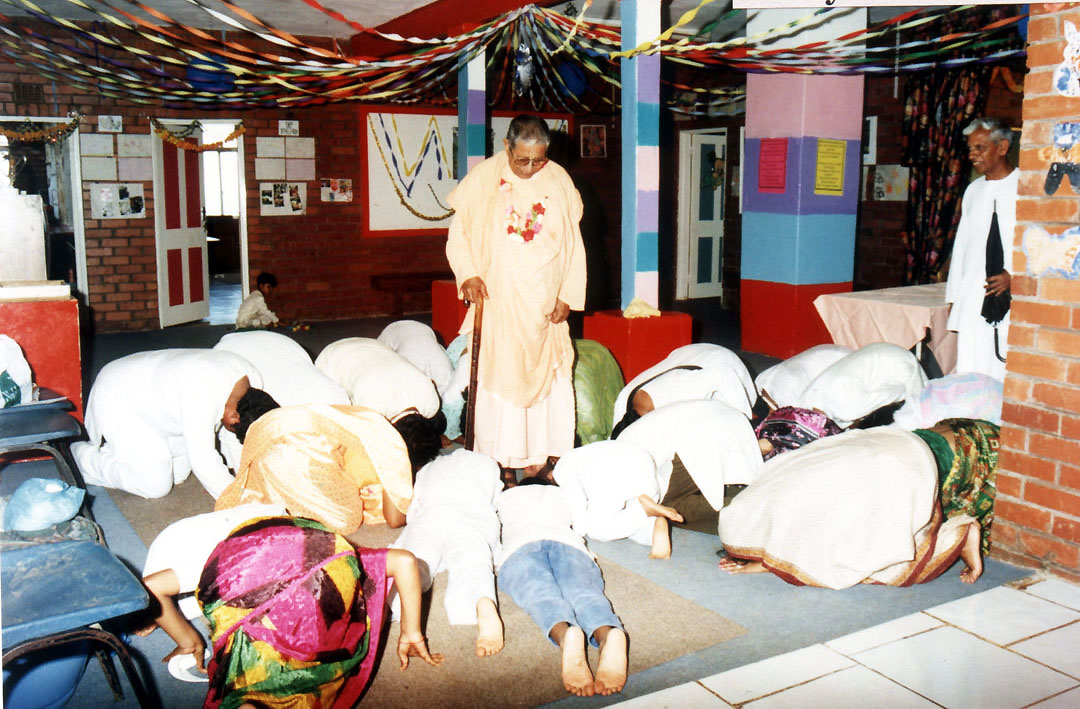Question: Everyone has some karma, and sometimes someone else’s karma is disturbing me. How can I understand when I should try to correct this other person’s karma? How can I know if it is correct or incorrect to try to modify another person’s karma? How can I understand how to act for my benefit and for the benefit of this other person?
Śrīla Govinda Mahārāj: Actually karma means action. It is the law of this material world, ‘To every action, there is an equal and opposite reaction’. This is Newton’s third law. As yet, no one has broken that law [laughter]. And there is good karma and bad karma. Good is what is giving us upliftment from the illusory environment to the transcendental plane. That is good karma. And there is some indication for that: what will be beneficial for everyone is good karma. And what is non-beneficial and what is harmful for others is called bad karma. Someone may be benefitted by that, but if it is breaking the society law, which has been made for the society’s benefit, we are considering that to be bad.
If our action, karma, will give us upliftment from the present level of the illusory environment to the transcendental plane, that will be very good karma. That is written in the scriptures. We see that there are so many religions in this material world within human society, but the target of all religions is to take us from a lower level to a higher level. And we can go up through our good karma. We see that indication within all religions. For that we are respecting all religions: all religions want our upliftment from this very lower level to a higher level. They are not only looking for their own benefit, but they are looking for the benefit of the human society, benefit of the dog society, benefit of the cow society, benefit of the plant society, even the benefit of the insect society: we can see that type of program within all religions. And we can practise that very easily if we follow this Kṛṣṇa consciousness.
If we follow Kṛṣṇa consciousness, then we can easily practise and go to a higher level. And there the process is this: humility, tolerance, and giving honour to others. This is the first conditional process. These three qualities will make the whole world our friend. My karma will be more pious, and my practising will be harmless. Otherwise, someone will kill some goat, someone will kill this, someone will do that. Sometimes it may not be harmful for me, but it will be harmful for others. I have seen that it is a law here that you cannot cut down a big tree. You cannot cut it, you must maintain it. We are practising Kṛṣṇa consciousness in this way.
Question: How can you recognise what is good and what is bad?
Śrīla Govinda Mahārāj: What is good for everyone is good, and what is bad for everyone is bad [laughter]. It is natural. But sometimes it happens here that we cannot understand that an activity’s result will be good in the future, though at present it looks bad. Then what will we do? Previously crystal sugar candy was the medicine for jaundice, hepatitis. It is written in the Ayurveda. But who has hepatitis will taste that sugar candy to be bitter, pittopatapta-rasanasya. When he first takes it, he will get a bitter taste, not a sweet taste. But finally it will give them their super benefit, and the disease will go out. Karma is also like that: we cannot always see that karma will give a sweet taste. In that case we must arrange a sugar coated pill, and then the disease will go out. For some persons the bitter is necessary, and for some persons sweet is necessary. But if the action will finally give a good result, then that karma will be good. If the final result will come good for everyone, that is good.
Pittopatapta-rasanasya: when we give them sugar candy, they will not feel that the taste is good. But finally it will cure them and they will taste the sweetness. But what is good for everyone and good for others is good karma. The colour may be a little different, and everyone will not feel it is tasteful. Everyone may not feel it is good, but for the patient it is necessary to give that type of karma to him, “Do this, do that.” It is not necessary for them to fully to understand, but according to their capacity they will take it.
Question: Does this mean that however it is coming we have to accept this medicine?
Śrīla Govinda Mahārāj: Yes, but the medicine must really be medicine and it will come from a doctor. Then that will be beneficial.
Question: Will the medicine have effect in a short time or long time?
Śrīla Govinda Mahārāj: It is depending upon the person, and depending upon the situation of the disease, and how much we are attached.
Spoken by Srila Gurudev during his visit to Italy in September 2000
Reference
syāt kṛṣṇa-nāma-charitādi-sitāpy avidyā-
pittopatapta-rasanasya na rochikā nu
kintv ādarād anudinaṁ khalu saiva juṣṭā
svādvī kramād bhavati tad-gada-mūla-hantrī
(Śrī Upadeśāmṛta, verse 7)
“The holy name, character, pastimes and activities of Kṛṣṇa are all transcendentally sweet like sugar candy. Although the tongue of one afflicted by the jaundice of avidyā [ignorance] cannot taste anything sweet, it is wonderful that simply by carefully chanting these sweet names every day, a natural relish awakens within his tongue, and his disease is gradually destroyed at the root.”

